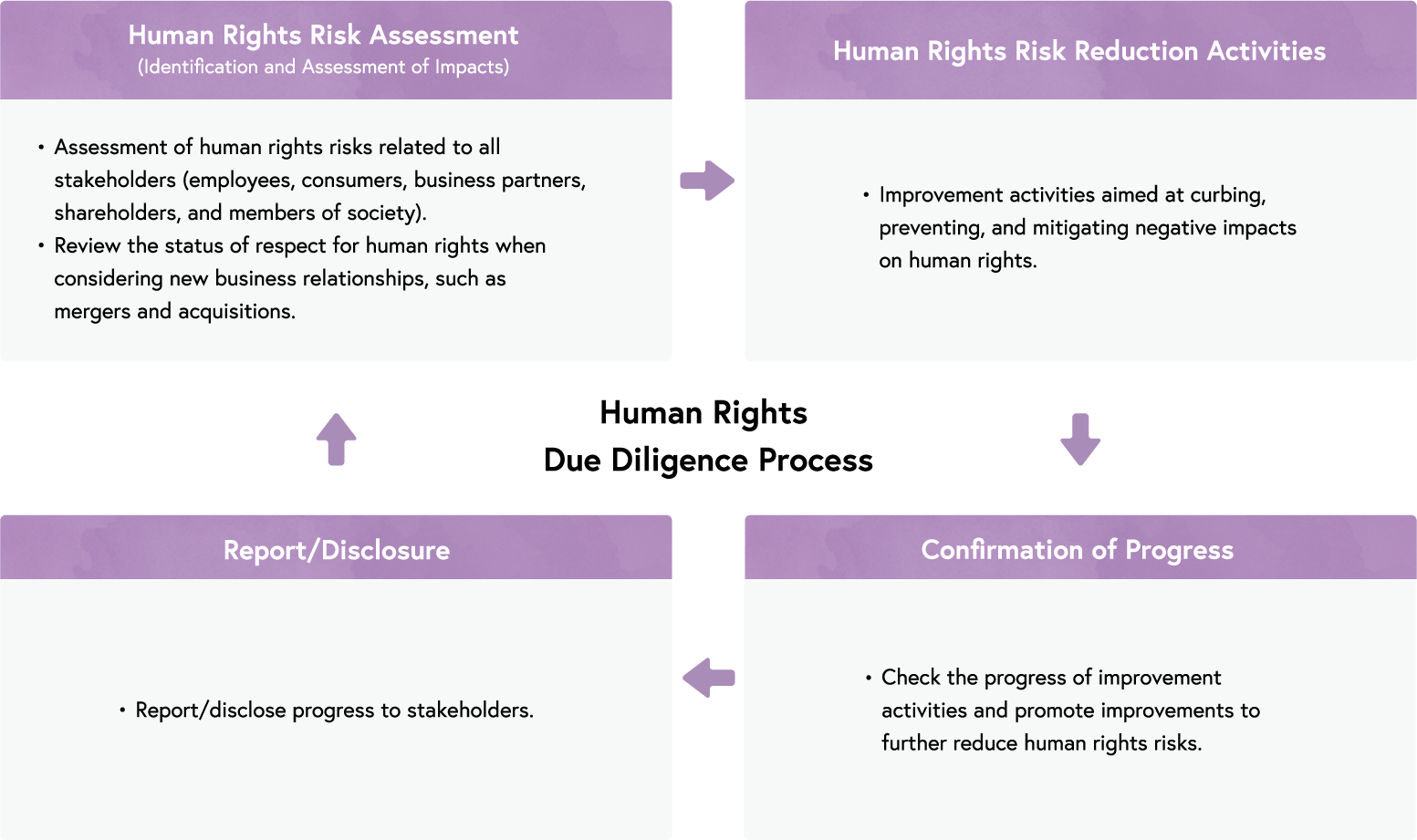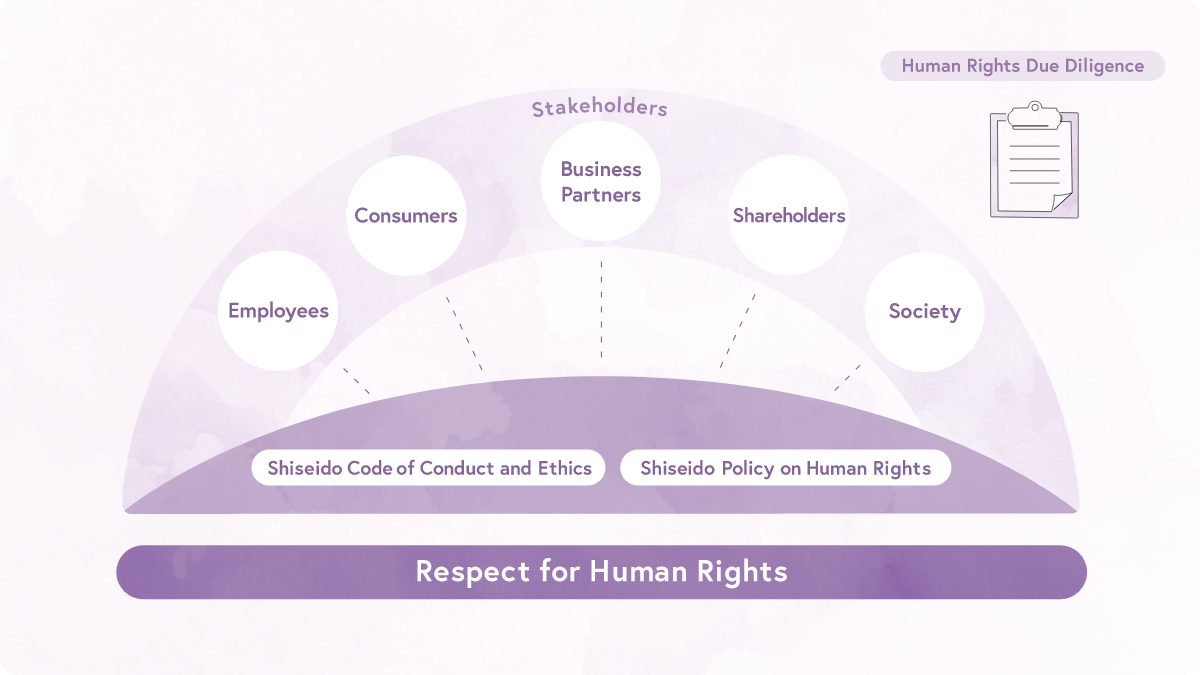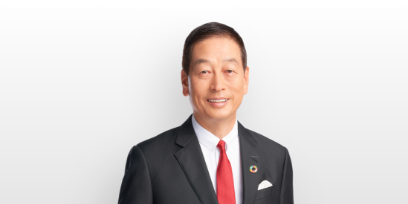Human Rights Due Diligence
Based on the United Nations Guiding Principles on Business and Human Rights (UNGPs), National Action Plans (NAPs) have been formulated in various countries, mainly in the EU, and many NAPs include a statement on human rights due diligence.
In 2020, we established a human rights due diligence process to promptly identify, prevent and mitigate potential human rights issues.
In addition to the visible human rights risks, potential negative impacts on human rights are regularly identified and risk mitigation measures are taken to prevent serious damage. Progress and findings are reported to the Sustainability Committee, a management meeting focused on the deliberation of sustainability- and human rights-related issues.
In any new business relationship, such as mergers and acquisitions, respect for human rights (compliance with personnel and labor issues, employee and customer safety, etc.) is part of the due diligence process for all investment decisions.

Human Rights Risk Assessment
In cooperation with external human rights experts, and by referencing international codes on human rights, standards on non-financial disclosures, and the Corporate Human Rights Benchmark (CHRB), we have developed a list of human rights issues to be considered. This list includes labor-related issues, such as forced labor and child labor, as well as a wide range of other human rights issues, such as freedom of association, the right to collective bargaining, and discrimination.
The human rights issues identified above were sorted by relevancy to each Shiseido stakeholder (employees, consumers, business partners, shareholders, and members of society). The severity and likelihood of both visible and potential human rights impacts were then assessed based on interviews with employees in Japan and overseas, and by investigating internal and external documents. In addition, we evaluated the risk of each human rights issue based on the status of Shiseido’s implementation of preventive and corrective measures.
After assessing our value chain, we identified a number of human rights risks: “discriminatory actions/expressions,” “violation of compliance/fair competition,” “personal/confidential information leakages,” “employees’ personal data and privacy,” “incomplete supplier management,” “occupational safety and health issues (work-related accidents),” “breach of working hours, breaks, and rest periods (overtime-work),” and “harassment and abuse.”
Human Rights Risk Reduction Activities
In 2021, the eight areas identified by the human rights risk assessment were reorganized and integrated into six categories according to issues and measures to be taken. Executive officers were then assigned to each category to implement improvement activities aimed at curbing, preventing, and mitigating negative impacts on human rights.
Human rights of employees are managed by the Human Resources and Risk Management departments, which promoted e-learning for employees and implemented activities to reduce the occurrence of occupational accidents.
Human rights of suppliers and contracted manufacturers are handled by the Supply Network Division, which continuously conducts supplier assessment programs and reviews procurement policies.
Human Rights Education and Training for Employees
Every year at our global headquarters in Japan, we conduct training on the Shiseido Code of Conduct and Ethics, and/or related policies and rules. This takes place through various internal programs, such as position-specific training, in order to promote a better understanding of ethical behavior among employees.
In 2021, due to the impact of COVID-19, we were unable to conduct training for executives and department directors. We did, however, conduct online human rights training for 1,566 managers in Japan, the theme for which was workplace harassment.
We also provided online human rights awareness training to employees in Japan. 14,295 employees participated in basic human rights training, while 14,577 employees participated in training focused on workplace harassment.
Reporting and Consultation Center for Suppliers
We established our Business Partner Hotline in 2013 to handle consultations, opinions and reports from suppliers and business partners. The center can be contacted by email or in writing.
Whistleblowing and Consultation Hotlines for Employees
We have established Whistleblowing and Consultation Hotlines at our global headquarters to handle consultations and reports from employees on various human rights and labor issues.
At each of our regional headquarters, contact windows have been setup to handle reports of violations of the Shiseido Code of Conduct and Ethics, internal rules and each country's/region's laws and regulations.
At our global headquarters in Japan, the “Shiseido Group Global Hotline” has been established to receive reports directly from employees of our affiliates around the world.
Employees can also directly e-mail the Audit & Supervisory Board to report on words and/or actions breach of ethics by directors and executive officers.
Furthermore, in Japan, we established “Sodan Room” (an in-house Shiseido hotline) and an “External Shiseido Hotline.” Both handle general workplace issues and whistleblowing, while the “Compliance Committee Hotline” is dedicated to whistleblowing.
Information about all our hotlines — including instructions for use, internal rules, fair research processes, prohibition of disadvantageous treatments of whistleblowers, and confidentiality of reported and consulted contents — is clearly communicated to every employee via a digital leaflet, intranet bulletin board messages, etc.






